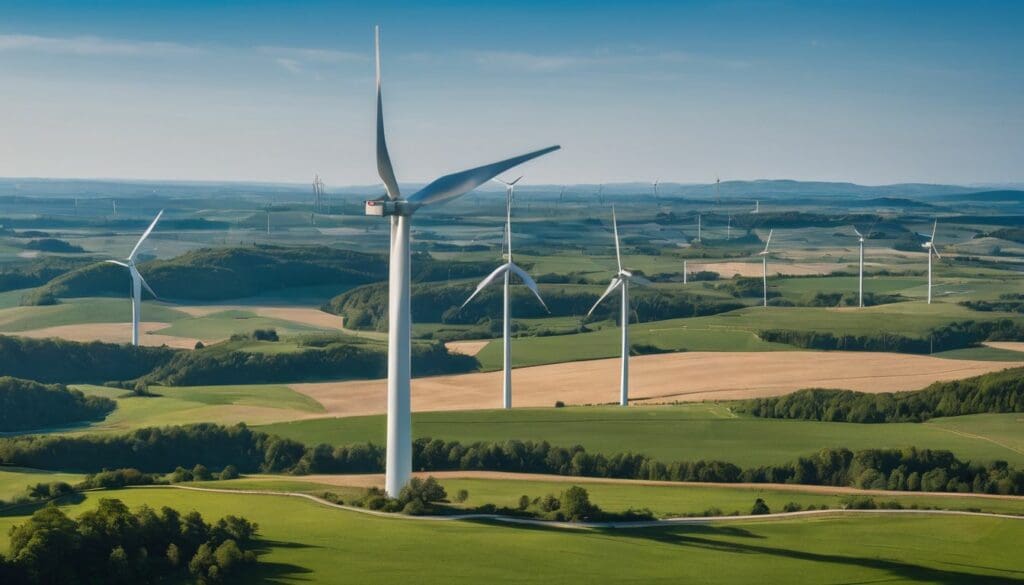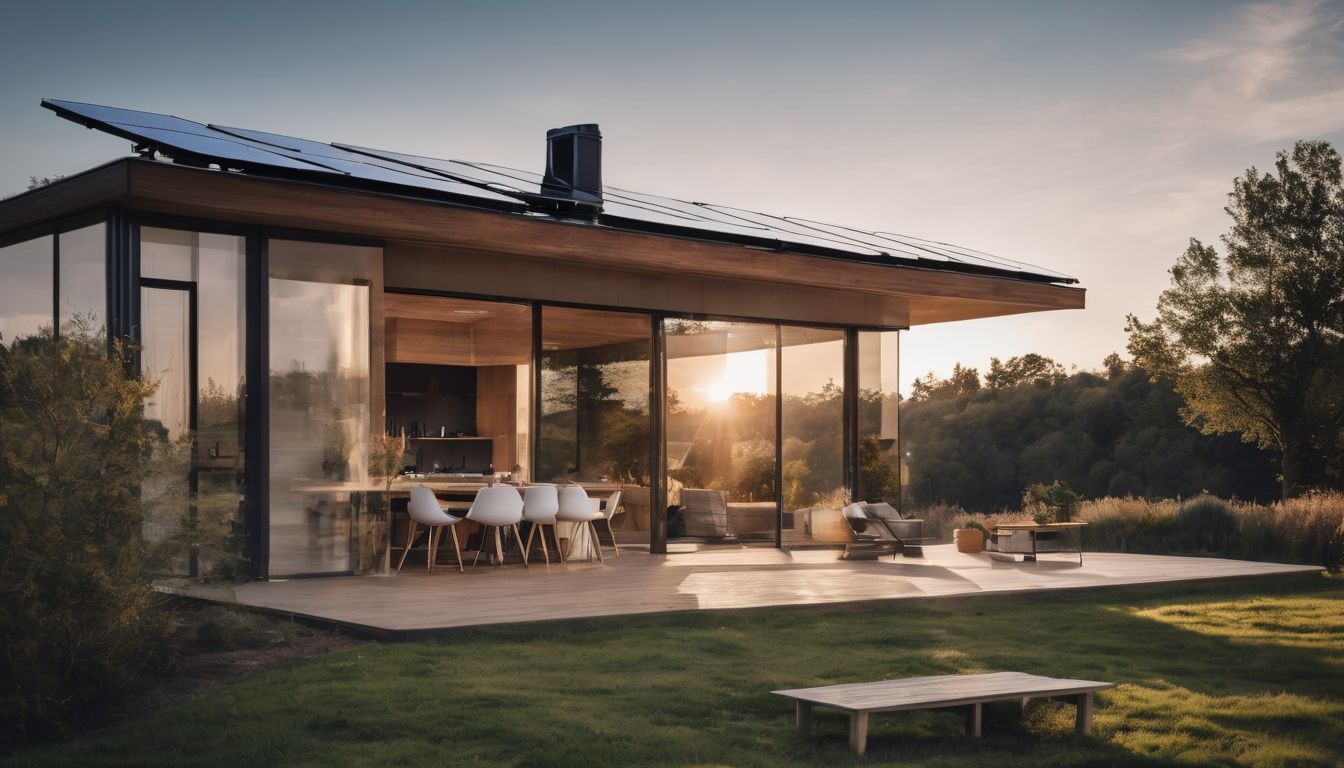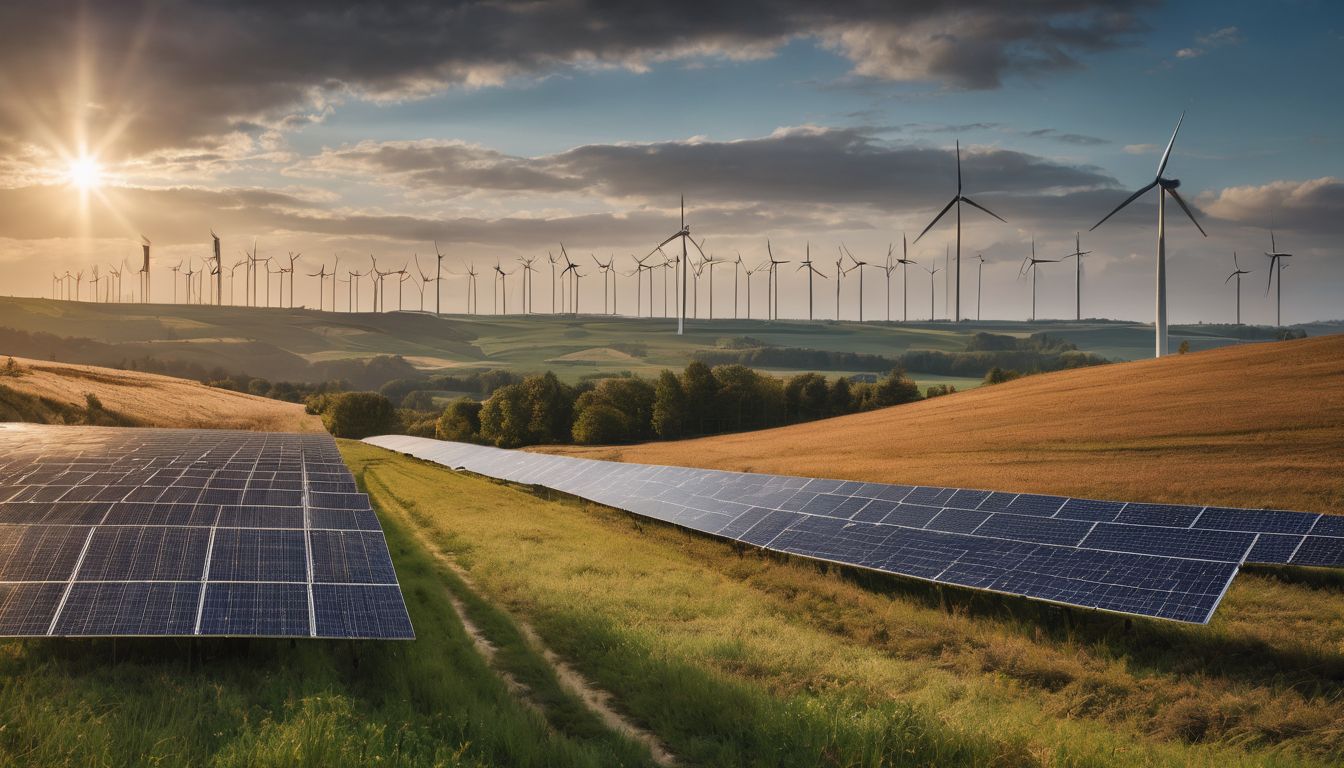Electric bills and environmental concerns weigh heavy on our minds these days. Remarkably, the cost of renewable energy has plummeted by over 70% in the last decade. This article will explore how switching to green power can not only save money but also bolster the economy and safeguard our planet.
Dive into a brighter future with us!
Key Takeaways
- Switching to renewable energy is becoming more affordable, with costs dropping by 70% in the last decade, leading to savings on household electricity bills and wider economic benefits.
- Renewable sources like wind and solar power create less pollution, improve public health, and offer a healthier environment for future generations.
- The renewable energy sector is a growing source of employment, providing new job opportunities across manufacturing, installation, maintenance, and research industries.
- Investments in renewable energy contribute to economic sustainability by creating long-term jobs, stimulating local economies and fostering innovation.
- The development of clean energy deployment and transmission infrastructure is vital for integrating renewables into the grid system while also opening up further employment prospects.
The Economics of Renewable Energy
Renewable energy is not only cheaper, but also promotes a healthier environment, creates new job opportunities and contributes to economic sustainability. This makes it an attractive option for individuals and businesses looking to reduce their carbon footprint.
cheaper
Investing in renewable energy is becoming increasingly cost-effective. Advances in technology and manufacturing have driven down the prices of solar panels and wind turbines, making them competitive with traditional fossil fuels.
Households save money on their energy bills when they switch to clean energy sources like wind and solar power.
Governments around the world see the financial benefits as well, offering tax incentives for those who install renewable energy systems. These savings contribute to an overall reduction in carbon footprint, pushing towards a sustainable and economically viable future.
Transitioning from conventional power means investing where it counts: both for your wallet and planetary health—leading directly into how adopting green solutions fosters healthier living environments.
healthier
Switching to renewable energy sources not only makes economic sense but also contributes to a healthier environment. By reducing our reliance on fossil fuels, we can significantly decrease air and water pollution, mitigating the impact of climate change and improving public health.
This transition supports cleaner air, reduces respiratory illnesses, and safeguards natural ecosystems from the harmful effects of carbon emissions.
Investing in sustainable energy sources such as wind power and solar energy is essential for creating a healthier future for both the planet and its inhabitants. The shift towards renewable resources offers an opportunity to combat climate change while promoting a cleaner, greener world for generations to come.
job creation
Renewable energy adoption results in the creation of new jobs, offering opportunities across various sectors. The growth in green energy industries spurs demand for skilled workers in manufacturing, construction, engineering, and research fields.
These emerging job opportunities contribute to economic growth while supporting the global transition towards sustainable energy sources.
The expansion of renewable energy initiatives fosters job creation vitality throughout local communities. Job sectors including solar and wind power installation, maintenance and innovation benefit from increased investment in zero-carbon technologies.
economic sustainability
Renewable energy promotes economic sustainability by creating long-term employment opportunities and driving economic growth. As more emphasis is placed on renewable energy sources, businesses can invest in new technologies, leading to increased innovation and market competition.
This not only enhances the economy but also supports the development of sustainable industries, making it a viable long-term solution for bolstering economic stability.
By embracing renewable energy, communities can reduce their reliance on non-renewable resources while generating local jobs that contribute to economic sustainability. This shift towards renewable energy fosters a resilient economy capable of adapting to changing global dynamics and reducing environmental impact.
The Transition to Renewable Energy
The transition to renewable energy involves a decrease in costs, diverse sources, and an increase in seasonal production. There is also a need for clean energy deployment and transmission construction.
To learn more about the impact on the economy, read our full blog post!
Decrease in costs
Renewable energy technologies, such as solar and wind power, have seen a significant decrease in costs over the years. This decline has made renewable energy more accessible and affordable for both businesses and households.
Improved technology, increased competition, and government incentives have all contributed to this cost reduction. The shift towards renewable energy is also driving down the overall cost of electricity production.
Moreover, decreased costs of renewable energy benefit consumers by reducing their electricity bills while also promoting economic sustainability. As more individuals and businesses switch to renewable sources, the demand for traditional fossil fuels decreases leading to further price reductions in the long run.
Diverse sources
As the costs for renewable energy decrease, the transition to diverse sources becomes increasingly feasible. This means that energy can be harnessed from multiple sources such as wind, solar, hydroelectric, and geothermal power.
Diversifying energy sources helps create a more resilient and sustainable system while also reducing reliance on fossil fuels. This shift contributes towards achieving climate goals by incorporating more zero-carbon sources into the energy mix, thereby facilitating decarbonisation of the economy.
Additionally, a diversified energy portfolio can lead to cost savings and improved economic sustainability in the long run.
Expanding the range of renewable resources allows for increased flexibility and adaptability within the energy system. Furthermore, diversification promotes innovation in technology and creates opportunities for new job growth in various sectors related to renewable energy production and distribution.
Increase in seasonal production
Renewable energy sources such as wind and solar power have the capacity to increase seasonal production. This means that during periods of high demand, these sources can generate more energy, providing a reliable and sustainable supply.
The use of diverse renewable energy sources also helps to ensure stable energy production throughout the year.
This stability in seasonal production contributes to a more resilient and robust energy system, meeting the demands of environmentally conscious individuals looking for sustainable alternatives.
The transition towards renewable energy is fundamental in achieving a cleaner and more efficient future.
Need for clean energy deployment and transmission construction
As renewable energy sources become more prevalent in the energy market, there is a growing need for clean energy deployment and transmission construction. This demand arises from the necessity to efficiently transport electricity generated from diverse sources such as wind and solar to areas with high energy consumption.
As a result, investments in building new transmission lines and upgrading existing infrastructure are crucial to facilitate the integration of renewable energy into the grid system.
The development of these clean energy facilities not only supports economic sustainability but also aligns with environmental conservation goals by reducing carbon emissions. It presents an opportunity for job creation in construction, engineering, and maintenance sectors while bolstering the resilience of the overall energy system against potential disruptions.
Impact on the Economy
The transition to renewable energy has the potential to create new jobs, lower consumer expenses and make good business sense. Clean energy deployment and transmission construction are crucial for this transition.
Potential for job growth
Renewable energy presents a significant opportunity for job growth, with the potential to create numerous employment opportunities in various sectors. As the demand for renewable energy increases, there will be a need for skilled workers in manufacturing, installation, and maintenance of renewable energy technologies.
Additionally, investment in renewable energy can spur innovation and entrepreneurship, leading to new job prospects within the clean energy industry.
The transition to renewable energy offers the potential to revitalise local economies by fostering job creation while promoting sustainable development. By investing in clean energy initiatives and infrastructure projects such as wind farms and solar panel installations, communities can experience an increase in employment opportunities and contribute to economic growth.
Lower consumer expenses
Switching to renewable energy can lead to lower consumer expenses, which is a compelling reason for many individuals to make the transition. By harnessing sources such as wind and solar power, households can significantly reduce their energy bills.
Additionally, with advancements in technology and infrastructure, the cost of implementing renewable energy systems continues to decrease, making it a financially wise decision.
Furthermore, the widespread adoption of renewable energy could lead to market competition and drive down prices even further. Ultimately, this shift towards sustainable energy not only benefits the environment but also puts money back into the pockets of consumers – an attractive prospect for those seeking both economic and environmental sustainability.
Good business sense
Switching to renewable energy makes good business sense. Investing in wind and solar power can lead to lower long-term expenses and increased economic sustainability. Embracing clean energy technologies can create new job opportunities, boost local economies, and improve the overall health of the environment.
Businesses that transition towards renewable energy sources can positively impact their bottom line while contributing to a cleaner, more sustainable future.
Adopting renewable energy sources demonstrates responsible environmental stewardship and sets a positive example for others in the community. By making the switch to zero-carbon sources, businesses can show their commitment to reducing greenhouse gas emissions and promoting long-term economic growth through sustainable practices.
Advantages of Renewable Energy
Renewable energy offers cheaper costs, healthier benefits for the environment, economic sustainability, and the creation of new jobs. Discover how making the switch to renewable energy can benefit both the planet and our economy.
Cheaper costs
Switching to renewable energy is associated with cheaper costs. By harnessing solar, wind, and hydro power, individuals and businesses can significantly reduce their energy expenses.
Renewable energy technologies have become more affordable in recent years, making the transition financially feasible for many people.
Investing in renewable energy not only reduces electricity bills but also provides long-term savings on maintenance and operation costs. Furthermore, as technology continues to advance, the cost of producing clean energy will likely decrease even further.
Healthier for the environment
Renewable energy is healthier for the environment as it produces little to no air or water pollution. By using sources such as wind, solar, and hydroelectric power, we can significantly reduce harmful emissions that contribute to climate change and environmental degradation.
This shift towards cleaner energy sources not only benefits human health but also helps protect delicate ecosystems and wildlife habitats.
Transitioning to renewable energy ensures a sustainable future for generations to come. The reduction in carbon emissions minimises the impact on climate change, contributing to a healthier planet overall.
Embracing renewable energy is an important step towards creating a more environmentally friendly society that prioritises conservation and sustainability.
Economic sustainability
Renewable energy offers economic sustainability by providing long-term, reliable energy sources that support a stable and resilient economy. By investing in renewable energy, we ensure the availability of affordable and clean power for future generations.
This not only reduces our dependence on fossil fuels but also creates jobs and stimulates local economies. With continued investment in renewable energy technologies, we can build a more sustainable and prosperous future for all.
As we explore the impact of renewable energy on economic sustainability, it’s essential to understand its potential for creating new opportunities across various industries. The transition to renewables opens doors for innovation, driving economic growth while promoting environmental stewardship.
It’s an exciting prospect that promises both financial prosperity and a healthier planet.
Creation of new jobs
In addition to economic sustainability, the transition to renewable energy sources is expected to result in the creation of new jobs. The shift towards wind, solar, and other zero-carbon energy sources will lead to a surge in employment opportunities within the renewable energy sector.
This growth is not only beneficial for individuals seeking employment but also has wider positive implications for the economy as a whole. As investment in renewable energy continues to increase, so too does the demand for skilled workers across various areas such as manufacturing, installation, maintenance, and research and development.
For those invested in environmental conservation and keen on contributing positively towards sustainable economic development, the prospect of job creation presents a compelling incentive to support the transition towards renewable energy.
Conclusion
Switching to renewable energy is an economic win-win. It creates new job opportunities in the clean energy sector and reduces consumer expenses, making it a smart business choice. Renewable energy not only saves money but also contributes to a healthier environment and ensures economic sustainability for future generations.
FAQs
1. What does switching to renewable energy mean for the economy?
Switching to renewable energy can have a positive economic impact by creating jobs, reducing dependency on imported fuels, and leading to an overall transition in our energy system towards zero-carbon sources.
2. Is it expensive to change over to wind or other renewable energies?
The initial cost of transitioning can be high; however, the long-term benefits like improved energy efficiency and lower operating expenses make renewables like wind energy economically attractive.
3. Can renewable energy improve how efficiently we use power?
Yes! Renewable energy systems often come with advancements that increase our overall energy efficiency, saving money and resources in the long run.
4. Will my business save money if I switch to zero-carbon sources for power?
In many cases, businesses will eventually see savings as they move away from fossil fuels and invest in zero-carbon sources due to lower maintenance costs, government incentives for renewables, and stabilised future energy prices.





